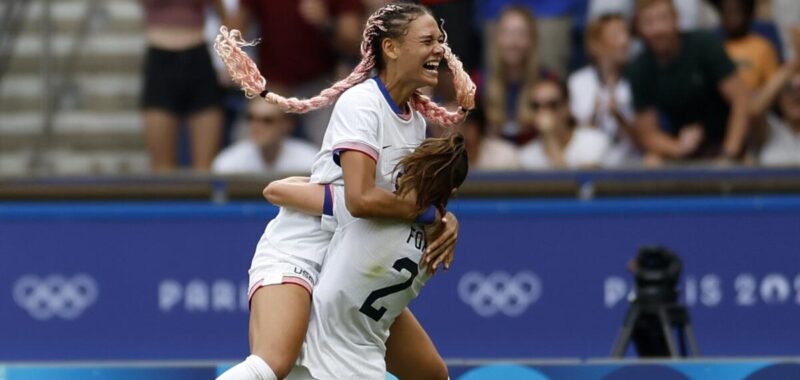Trinity Rodman’s left-footed curler from inside the penalty area snapped a scoreless tie in the first extra-time period Saturday, giving the U.S. women a 1-0 win over Japan at packed Parc des Princes stadium and a spot in Tuesday’s semifinals of the Paris Olympics soccer tournament.
The Americans will play the winner of Saturday’s late quarterfinal final between Canada and Germany.
The U.S., which saw its run through last summer’s World Cup end in penalty kicks after playing Sweden to a scoreless draw, seemed headed toward penalties again when Rodman ran onto a long diagonal ball from Crystal Dunn along the right side of the 18-yard box. She then cut back to evade Japanese defender Hikaru Kitagawa before slicing a bending shot over keeper Ayaka Yamashita and into the top netting.
The score gave Rodman, who was barely onside on the play, goals in three of the four U.S. games in France.
The U.S. made the gold-medal match in four of the first five women’s Olympic tournaments, winning it four times. But the Americans haven’t been back since 2012, falling in the quarterfinals eight years ago in Brazil and losing to Canada in the semifinals three years ago in Japan. It was then eliminated from last summer’s World Cup in the round of 16, its earliest exit ever.
So it was Japan who came into this game with the poise, experience and chemistry that was once the hallmark of the U.S. Nine of the 11 players Japan started in the World Cup quarterfinals last summer are on its Olympic roster, including Hinata Miyazawa, the World Cup’s leading scorer. And 11 of the 18 women on the team play club soccer in Europe.
Japan also has the same coach, Futoshi Ikeda.
The U.S., meanwhile, has undergone a major overhaul since the loss in Australia. Half of the 18 players in Paris weren’t with the team a year ago, nor was coach Emma Hayes, who was about to enter her 12th season with Chelsea in the Women’s Super League. Fifteen women play domestically in the National Women’s Soccer League.
Yet it was the experienced, worldly Japanese who elected to bunker in, ceding possession — the U.S. had the ball for all but 10 of the first 45 minutes and for 67 of the regulation 90 minutes — and challenging the Americans to find a way through a wall of five blue-clad defenders that stretched from one end line to the other.
That neutralized a U.S. attack that was so good in group play, scoring a tournament-best nine goals, and led the uncertain Americans to play the ball backward as often as they played it forward. As a result, the teams went to extra time having taken just one shot on goal apiece.
The game was so lacking in offense and attacking creativity, in fact, that some in the sellout crowd began whistling in complaint just before the intermission, then again multiple times in the second half.
Early in the first extra period Sophia Smith gave the U.S. a glimmer of hope, picking the pocket of a Japanese keeper then racing into the box with only Yamashita to beat, But she took one touch too many, allowing the keeper to cut down the angle and make the save.
Minutes later Rodman made the play moot.

